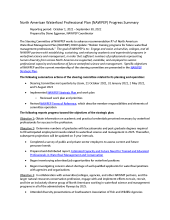
Reporting period: October 1, 2021 – September 30, 2022
Prepared by Diane Eggeman, NAWPEP Coordinator
The Steering Committee of NAWPEP works to advance recommendation #7 of North American Waterfowl Management Plan (NAWMP) 2018 Update: “Bolster training programs for future waterfowl management professionals.” The goal of NAWPEP is to: Engage and assist universities, colleges, and all NAWMP partners with establishing, sustaining, and enhancing academic and experiential programs in waterfowl science and management, in order that sufficient numbers of professionals representing human diversity from across North America are supported, available, and employed to sustain professional capacity and excellence of future waterfowl science and management. Specific objectives of NAWPEP and the current membership of the steering committee are presented in the NAWPEP Strategic Plan.
The following summarizes actions of the steering committee related to its planning and operation:
- Steering Committee met quarterly by Zoom, 21 October 2021, 31 January 2022, 2 May 2022, and 5 August 2022
- Implemented NAWPEP Strategic Plan and work plan
- Reviewed work plan and priorities
- Revised NAWPEP Terms of Reference, which describe member responsibilities and elements of committee operation
The following reports progress toward the objectives of the strategic plan:
Objective 1: Obtain information on academic and practical credentials perceived necessary by waterfowl professionals for success in the profession.
Objective 2: Determine numbers of graduates with baccalaureate and post-graduate degrees required to fill anticipated employment needs related to waterfowl science and management in 2025. Thereafter, subsequent projections will be updated on 5-year intervals.
- Completed a survey of public and private-sector employers to assess current and future personnel needs
- Prepared and distributed report, Estimated Capacity and Future Need for Trained and Educated Professionals in Waterfowl Management and Conservation
- Began inventorying advertised job opportunities for waterfowl positions
- Began investigating concern about shortage of well-qualified applicants for waterfowl positions with agencies and organizations
Objective 3: In collaboration with universities/colleges, agencies, and other NAWMP partners, and the larger natural resources conservation profession, engage with and implement efforts to train, recruit, and hire an inclusively diverse group of North Americans working in waterfowl science and management programs in all of the administrative Flyways by 2025.
- Attended diversity presentations at Southeastern Association of Fish and Wildlife Agencies
- Met with U.S. Fish and Wildlife Service diversity specialist to explore possibilities for communicating about employment opportunities and fellowships to diverse audiences.
- Maintained connections with North American Bird Conservation Initiative and its efforts toward diversity and inclusion
- Began investigating partnership with Canadian indigenous groups
Objective 4: Promote and facilitate institutional educational and skills capacity to meet projected needs per Objectives 2 and 3.
- Compiled inventory of fellowships, internships, etc. to help identify gaps and needs
- Continued efforts with University of Texas – El Paso to offer online course in Spanish on waterfowl ecology and management to Ducks Unlimited-Mexico (DUMAC) and other Latin American professionals
- Communicated findings and progress to the waterfowl and wetland management community via the NAWMP Committee and its working groups, AFWA’s Waterfowl Working Group, flyways, and faculty
- Published article, “Training Waterfowl Conservationists of the Future” in The Wildlife Professional, a publication of The Wildlife Society
- Summarized results of survey of university waterfowl faculty seeking input on barriers, opportunities, specific actions, and communication needs related to NAWPEP
- Prepared presentation about NAWPEP and importance of university waterfowl programs for professors to give to university colleagues and departments
- Gave presentations about NAWPEP at Joint Aquatic Sciences Meeting and to group of faculty and students
